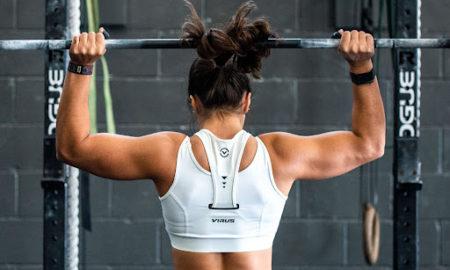

Creatine has so many potential benefits you may have never even considered.
By Sarah Butcher
You already eat a healthy diet with more vegetables, legumes and lean meat (unless you’re a vegetarian) than you care to mention, go to the gym so regularly that the bench press is your only friend and take pride in all of your healthy decisions. The question is: Are you seeing the gains you want? Do your energy levels, cognitive functioning and muscle gains reflect all of that hard work? If not, then maybe you’re missing a little something extra – something that could bolster your efforts and gains. Creatine could be a missing ingredient to your success.
Commonly sold in the form of creatine monohydrate, creatine is an amino acid that occurs naturally in the body. It’s made in the liver, kidneys and pancreas to provide energy to cells in our muscles and other parts of our bodies.
Of course, creatine is popular among athletes for its energy-boosting and mass-building effects, but it offers numerous other benefits for healthy people, as well as for those suffering from certain illnesses. Creatine has also been shown not to degrade after ingestion. It’s used by either the body’s muscles or excreted in urine and has also been shown to have no medically significant reported side effects.
Because of its positive effects, creatine is quite popular and consumed as a supplement in the form of energy bars, tablets, powders and drink mixes. It’s widely available at health and nutrition shops, as well as drug stores and grocery stores.
Now that you know some basics about creatine, you might be wondering: Is it worth all the hype? The reality is that creatine does more than just boost energy in your muscles. It can positively affect your mental energy and your overall bodily functioning. Researchers have taken an interest in this compound and have discovered some fascinating ways that creatine can be used to improve health. What follows is some of the most important creatine health benefit discoveries.
1. Increase Energy
Adenosine triphosphate (ATP) is a significant chemical compound that powers the cells in your body – especially your muscles. According to a study published in the Journal of the International Society of Sports Nutrition, higher levels of creatine are associated with more rapid regeneration of ATP. That’s beneficial in numerous ways, the first of which being that, because ATP is the compound that powers muscles, faster regeneration means muscles will have more energy.
2. Enhance Brain Function
Creatine monohydrate isn’t just beneficial if you want to improve your physical health. Believe it or not, it may benefit you psychologically, too. In a double-blind, placebo-controlled study, researchers in Australia studied the effects of creatine supplementation on 45 young adult vegetarians. They found that the group who supplemented with creatine (5g per day) performed better than the control group in a series of memory and intelligence tests. It was concluded that creatine could boost memory and intellectual functioning, at least in the short term.
Research suggests that creatine supplementation may also benefit people who are struggling with major depression. Medications such as SSRIs can be very effective in treating depression, but one of their downsides is that they can take a minimum of a few weeks to really have an impact. Researchers are hopeful that creatine may be helpful to people who do not respond as well or as quickly to SSRIs.
3. Increase Bone Density
There are multiple reasons why aging adults should consider creatine supplementation, and this is one of them. Creatine supplementation, especially when paired with a healthy lifestyle and exercise, has been shown in a study based out of Switzerland to improve bone density and the overall health of the musculoskeletal system. Our bone health is important to consider at any age, and creatine could help prevent osteoporosis and osteopenia.
4. Increase Glucose Tolerance
More research must be done on the effects of creatine supplementation on glucose tolerance, but some studies already conducted on animals and people have shown that creatine consumption may alter glucoregulation in skeletal muscles. Some research, including a Canadian study published in The Journal of Physiology, has found that creatine supplementation may increase the body’s tolerance to glucose, especially when combined with protein supplementation and changes in activity levels. As a result, researchers are curious about the impact that creatine could have on people with type-2 diabetes. Granted, the research in this area is still lacking due to the need for long-term studies, but it’s possible that creatine could at some point play a role in the regulation of type-2 diabetes.
5. Diminish Fat-Free Mass
Still trying to shed a few pounds of unwanted fat? Good news! The energy-boosting effects of creatine help boost your body’s metabolism. When combined with the muscle-building effects of creatine, people who take this supplement experience a decrease in fat-related mass. This shouldn’t be confused with overall weight loss, as this isn’t a recommended use for creatine. In fact, according to a Palm Beach Atlantic University study published in the Journal of Strength and Conditioning Research, many people who take creatine may experience weight gain due to an increase in muscle mass and, especially in the first few weeks of use, water retention.
6. Increase Muscle Mass
We get it: This may be sixth on the list, but it’s number one in your heart and probably the first one you stopped to read closely. With that said, if you spend a lot of time at the gym, you probably already know that creatine is a popular supplement for increasing muscle mass. That’s one of the most well-studied and scientifically supported uses for creatine supplementation. Of course, there’s no shortcut to building a healthy body and increased muscle mass, but, in conjunction with healthy eating and time devoted to exercise, creatine can significantly augment your results.
7. Improve Anaerobic Performance
Athletes taking a creatine supplement have been shown to perform significantly better in activities related to anaerobic performance. This has been one of the most popularly studied uses for creatine. In one recent study, researchers found that participants consuming a creatine supplement performed significantly better than those who did not. As well, it should be noted that this study published in the Biology of Sport indicated that adding carbohydrates in conjunction with the creatine supplement did not increase the quality of performance in contrast to taking creatine alone.

8. Enhance Strength
We all want to make the most of our gym efforts. That means crafting a perfect physique along with the strength necessary for performing day-to-day activities. Creatine can help. When weight training and other forms of exercise are performed with the aid of creatine, athletes experience far more gains, especially in terms of strength. A study published in Medicine and Science In Sports and Exercise involving 23 male participants with previous weight-training experience split participants into two groups. What did they find? Researchers discovered that the participants who took an oral creatine supplement experienced greater increases in upper-arm strength and fat-free mass following strength-training exercises than those who did not take the supplement.
9. Prevent Mental And Physical Decline In Aging Adults
As mentioned, creatine supplementation can have a great impact on people who need a mental boost. This is especially important for aging adults who may experience a decline in their working memory. And, as we age, the muscles in our body also degenerate and we lose mass. Research published in the Journal of Applied Physiology has shown that, in combination with staying physically active, creatine supplementation increases strength in older adults. In one particular study, aging adults were given a supplement of creatine and linoleic acid while another group was given a placebo. All of the participants executed the same exercise program, but the group taking the creatine and linoleic acid gained more fat-free mass, enjoyed greater endurance during their workouts and experienced a decrease in fatty body mass.
10. Improve Performance And Muscle Mass Status In Vegetarians
Creatine is found naturally in our bodies, but vegetarians are likely to have lower baseline levels of it than people who consume meat. Why? Meat is one of the primary sources of creatine. As a result, research published in the Journal of the International Society of Sports Nutrition concluded that vegetarians and others who consume little meat could especially benefit from supplementing creatine into their diets.
11. Improve The Strength Of People With Muscular Dystrophy
Researchers discovered yet another incredible medical use for creatine. In a study conducted in Germany, participants with muscle disorders who supplemented their diets with creatine experienced a significant increase in muscular strength as compared to those who did not. Considering the limited side effects and high tolerance for this supplement, this is an important finding. However, when it comes to diseases, you should always discuss the use of a supplement with your practitioner.
There’s still a lot of research to be done on the various potential benefits of creatine and it’s important to remember that you can’t depend on supplements to do the work for you. But if you’re working hard and treating your body right, supplements can take you much farther than you could go on your own. Creatine has been shown to have great, positive impacts on muscle, mind and bones, and it may have even greater clinical uses. If you aren’t supplementing with creatine, it’s definitely something you might want to consider.


















You must be logged in to post a comment Login